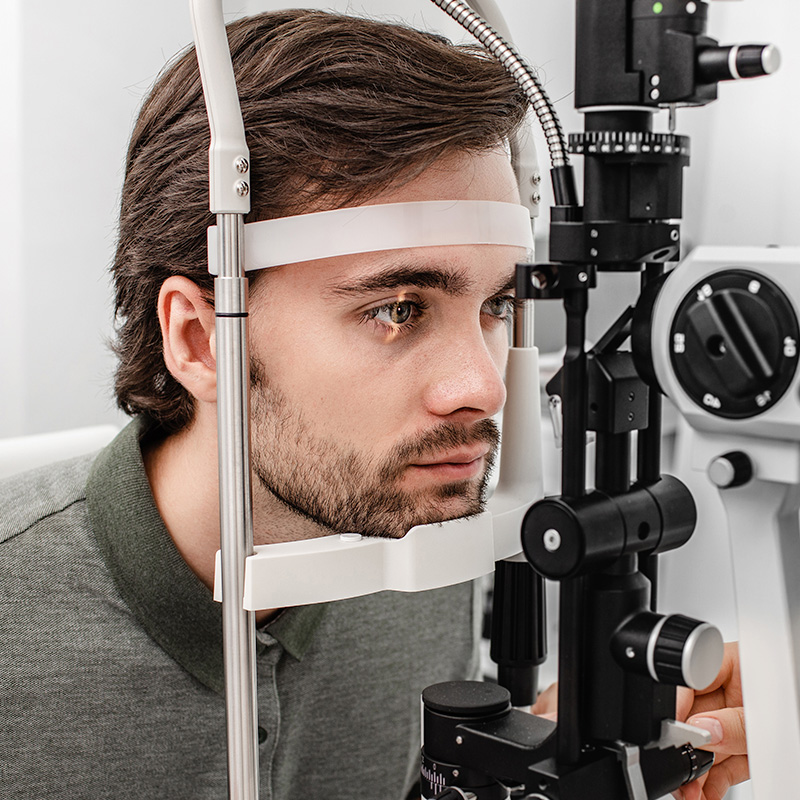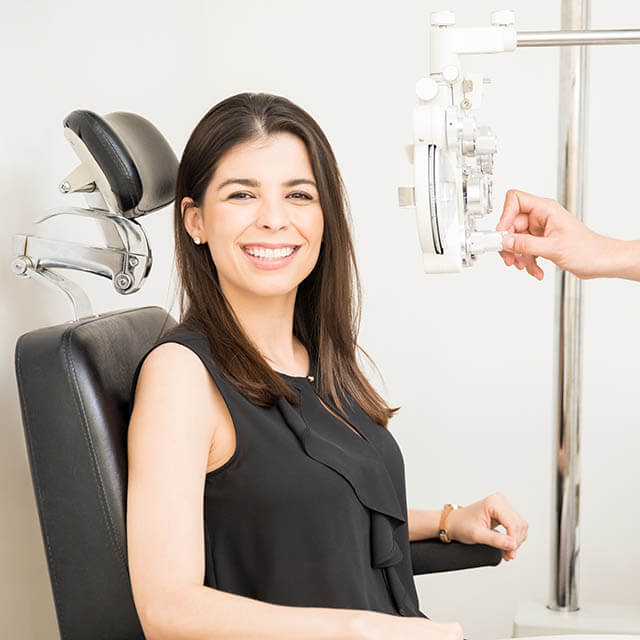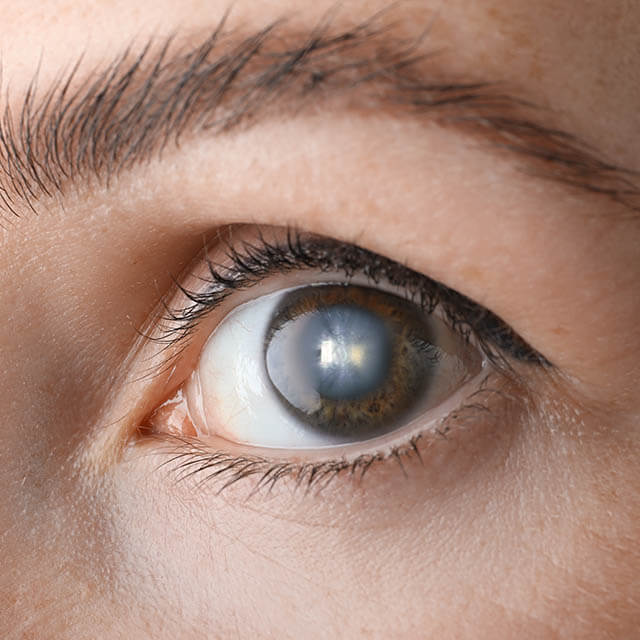Eye Disease Diagnosis and Treatment
Learn about our comprehensive approach to managing eye diseases and preserving your vision for the long term.

Your eyes constantly change, even as you age. That’s why it’s essential to get regular eye exams, especially as you get older.
At Forney Eye Associates, we specialize in detecting early signs of eye conditions and diseases, such as diabetic retinopathy, glaucoma, cataracts, and macular degeneration. We offer a variety of diagnostic tests and treatments to help you maintain the best vision and eye health possible.

- Comprehensive eye exams: Our comprehensive eye exams include a variety of tests to check your vision, eye health, and risk factors for eye diseases.
- Early detection and treatment of eye diseases: We can detect early signs of eye diseases and diseases and recommend appropriate treatment options to help prevent vision loss or slow disease progression.
- Specialized care for eye conditions: We offer specialized care for various eye conditions, including diabetic retinopathy, glaucoma, cataracts, and macular degeneration. We work with you to develop a personalized treatment plan that meets your needs.
We understand that eye problems can be scary and overwhelming. That’s why we’re here to support you every step of the way. We will walk you through your diagnosis and treatment options and answer any questions you have along the way.
Extraordinary office! I’ve been seeing Dr. Tran for all my eye care needs since they opened and I never leave unimpressed. Dr. Tran is very thorough and has an equally knowledgeable team, all with great personalities! The office itself is extremely nice with a large selection of frames to fit your lifestyle/ preference. Definitely recommend!!!!!!!
Our Disease Treatment Services
What Is Diabetic Retinopathy And How Can It Be Treated?
High blood sugar levels, a consequence of diabetes, can cause significant damage to the blood vessels in the retina, which is the light-sensitive tissue at the back of the eye, leading to diabetic retinopathy, a serious eye condition.
Diabetic retinopathy can lead to vision loss and blindness if not treated. However, early detection and treatment can help to preserve vision.
SymptomsThe early stages of diabetic retinopathy often have no symptoms. However, as the disease progresses, people may experience the following symptoms:
- Blurred vision
- Floaters and cobwebs in the vision
- Dark spots in the vision
- Difficulty seeing at night
- Loss of central vision
There is no cure for diabetic retinopathy, but there are treatments that can help slow the progression of the disease and prevent vision loss. Treatment options include:
- Medication: Medications can control blood sugar levels and reduce inflammation in the retina.
- Anti-VEGF or steroid injections: These injections can shrink blood vessels and reduce inflammation in the retina.
- Laser surgery: Laser surgery can seal off leaking blood vessels and prevent the growth of new blood vessels.
- Vitrectomy: Vitrectomy is a surgical procedure to remove the vitreous, the gel-like substance that fills the center of the eye. This procedure is typically for cases of severe diabetic retinopathy.
Prevention
The best way to prevent diabetic retinopathy is to control blood sugar levels. People with diabetes should also have regular eye exams to detect and treat the disease early.
What Is Glaucoma and How Can It Be Treated?
Glaucoma is a group of eye diseases that can cause vision loss and blindness. A buildup of pressure in the eye causes it. This pressure can damage the optic nerve, which carries signals from the eye to the brain.
Glaucoma is a leading cause of blindness in adults. Over 3 million Americans are estimated to have glaucoma, and many do not know they have it.
Symptoms
The early stages of glaucoma often have no symptoms. However, as the disease progresses,
people may experience the following symptoms:
- Blurred vision
- Loss of peripheral vision
- Tunnel vision
- Halos around lights
- Pain in the eye
Treatment
There is no cure for glaucoma, but there are treatments that can help slow the progression of the disease and prevent vision loss. Treatment options include:
- Eye drops: Eye drops can reduce the pressure in the eye.
- Oral medications: Oral medications can also reduce the pressure in the eye.
- Filtration surgery: Filtration surgery creates a new drainage channel in the eye to help reduce pressure.
- Laser therapy: Laser therapy can open blocked drainage channels or create new ones.
- Drainage tubes: Drainage tubes can be implanted in the eye to help reduce pressure.
- Minimally invasive glaucoma surgery (MIGS): MIGS is a newer type of surgery that is less invasive than traditional surgery.
Prevention
There is no way to prevent glaucoma, but early detection and treatment can help to preserve vision. People should see their eye doctor for regular eye exams, especially if they are at risk for glaucoma.


What Are Cataracts and How Can The Disease Be Treated?
Cataracts are a condition in which the eye's clear lens becomes cloudy, causing blurred vision, difficulty seeing at night, and sensitivity to light. Cataracts are the most common cause of vision loss in people over 40.
Symptoms
The early stages of cataracts often have no symptoms. However, as the cataract progresses, people may experience the following symptoms:
- Blurred vision
- Cloudy or hazy vision
- Difficulty seeing at night
- Difficulty seeing in bright light
- Double vision
- Halos around lights
- Faded colors
Treatment
The only way to treat a cataract is with surgery. Cataract surgery is a safe and common procedure. During surgery, the cloudy lens is removed and replaced with a clear artificial lens called an intraocular lens (IOL).
What is Macular Degeneration and
How Can It Be Treated?
Macular degeneration is a condition that causes damage to the macula, the central part of the retina. The retina is the light-sensitive tissue at the back of the eye that converts light into electrical signals sent to the brain. The macula is responsible for sharp, central vision.
There are two types of macular degeneration: dry AMD and wet AMD.
- Dry AMD is the more common form of macular degeneration. It occurs when the cells in the macula gradually break down. There is no cure for dry AMD, but there are treatments that can help to slow the progression of the disease.
- Wet AMD is a less common but more serious form of macular degeneration. It occurs when abnormal blood vessels grow under the macula and leak blood and fluid. There is no cure for wet AMD, but there are treatments that can help stop the growth of abnormal blood vessels and prevent vision loss.
Symptoms
The symptoms of macular degeneration vary depending on the type and severity of the disease. Common symptoms include:
- Blurred vision
- Loss of central vision
- Difficulty seeing in low light
- Distorted vision
- Straight lines appearing wavy
- Dark spots in the vision
Treatment
There is no cure for macular degeneration, but there are treatments that can help slow the progression of the disease and prevent vision loss. Treatment options vary depending on the type and severity of the disease.

FAQ
We believe that a person’s quality of life is profoundly associated with the quality of their vision. Vision problems, whether due to glaucoma, cataracts, macular degeneration or diabetic retinopathy, affect all aspects of one’s life. We at Forney Eye Associates Lasik & Cataract Surgery Center can help prevent further vision deterioration and manage your current symptoms.
Schedule a consultation with our optometric team and we’ll help you find the best solution for your condition and lifestyle.
